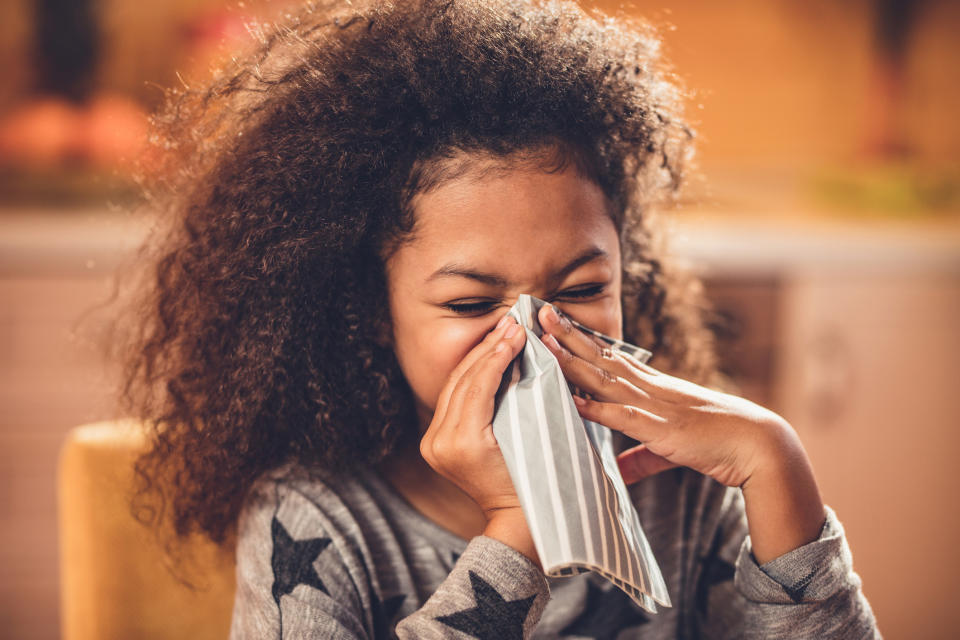The number of children 'at risk' for life-threatening allergies is up 104 percent
Severe allergies are terrifying, especially when they affect children. Now, a large-scale new report has found that severe allergies seem to be increasing among kids in the U.S.
The report, which is from insurance company Blue Cross Blue Shield, analyzed allergy diagnoses and visits to the ER for anaphylaxis, a severe, potentially life-threatening allergic reaction that can cause swelling and make it hard to breathe. The report surveyed BCBS subscribers from 2010 to 2016 and included 9.6 million children aged 18 and below from all across the country.
During those seven years, the report found that the number of children who were diagnosed as being “at risk” for anaphylaxis jumped 104 percent. Not only that, but ER visits for anaphylaxis more than doubled, from 1.4 visits per 10,000 children in 2010 to 3.5 visits in 2016.

Allergic reactions to foods were responsible for nearly half of the anaphylaxis episodes, with exposure to peanuts causing the majority, at 22 percent. Tree nuts and seeds (15 percent) and milk and eggs (6 percent) made up the rest of known causes. But 53 percent of the allergic reactions were due to unknown foods or other unspecified causes like insect bites.
Unfortunately, it’s not really known why the number of children with life-threatening food allergies is increasing, Jamie Kiehm, MD, an allergist and immunologist with ENT and Allergy Associates, tells Yahoo Lifestyle. However, there are some theories.
One is the “hygiene hypothesis,” which suggests that living conditions “might be too clean and that kids aren’t being exposed to germs that train their immune systems to tell the difference between harmless and harmful irritants,” per the American Academy of Allergy, Asthma & Immunology (AAAAI). Another is that the increased use of acetaminophen in children might increase their risk of developing allergies. But again, this isn’t known for sure.

If you have children, it’s understandable that you’d be nervous about these findings. Unfortunately, there’s no way of knowing if children are allergic to a certain food before they eat it, S. Daniel Ganjian, MD, a pediatrician at Providence Saint John’s Health Center in Santa Monica, Calif., tells Yahoo Lifestyle. Skin testing to see if your child has an allergy to certain foods before your child is exposed to them isn’t recommended, Kiehm says. (However, she adds, there is an exception if your child has an egg allergy or history of eczema, since these are linked to other allergies to foods such as peanuts.)
If you want to do what you can to try to safeguard your child, there are a few things the AAAAI says that you can do. One is to breastfeed your baby — this can possibly reduce the risk of early eczema, wheezing, and a cow’s milk allergy, the AAAAI says. Another is gradually introducing eggs, dairy, peanuts, tree nuts, fish, and shellfish to your baby when he or she is 4 to 6 months old. This should be done only if your child has no known allergies and no eczema, Purvi Parikh, MD, an allergist/immunologist with the Allergy & Asthma Network, tells Yahoo Lifestyle. The foods should also be introduced in small quantities every three to five days, she says. If your baby has no reaction, he or she is fine to keep eating those foods.
One important thing to keep in mind, though, per Ganjian: If you, your partner, or other children in the family have severe allergies, you should talk with your child’s pediatrician or an allergist before exposing your child to allergenic foods.
Anaphylaxis isn’t the only allergic reaction your child can have. Other symptoms include hives; swelling of the tongue, lips, or throat; shortness of breath or wheezing; an itchy mouth or throat; and abdominal discomfort or repetitive vomiting or diarrhea, Kiehm says.
If your child does develop an allergic reaction or has a sibling with a peanut allergy, it’s important to consult a doctor, according to the AAAAI. And if your child develops anaphylaxis, use an epinephrine auto-injector such as an EpiPen (if you have one) and call 911 immediately. “These reactions progress very quickly and can be life-threatening,” Parikh says.
Read more from Yahoo Lifestyle:
Follow us on Instagram, Facebook, and Twitter for nonstop inspiration delivered fresh to your feed, every day.
